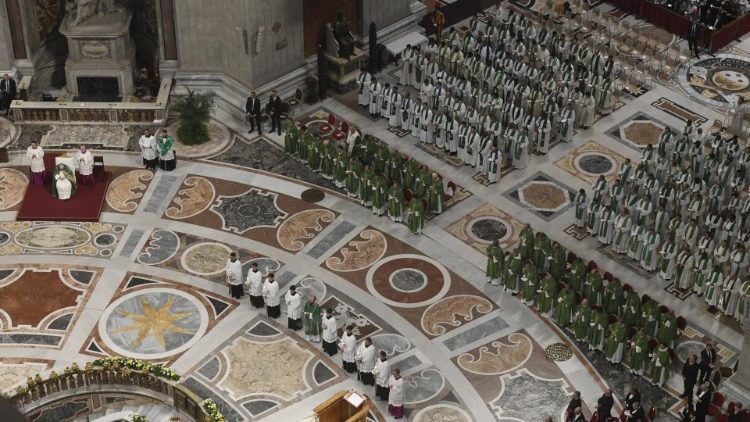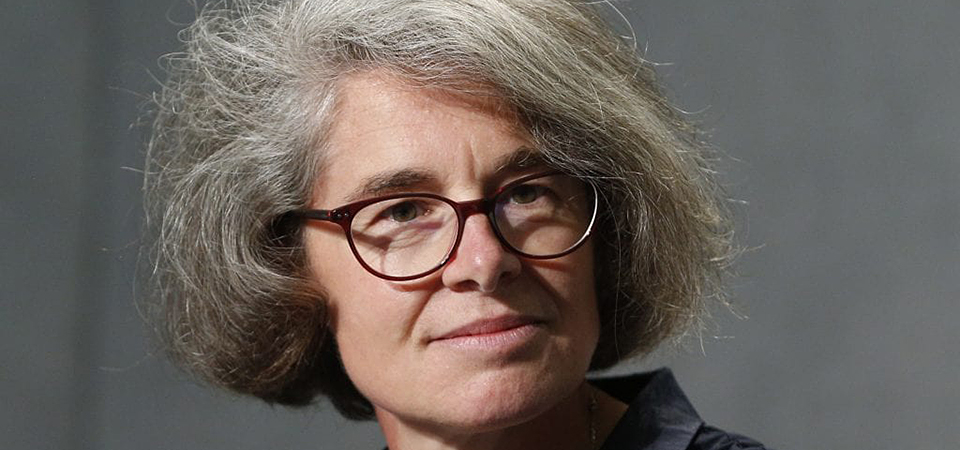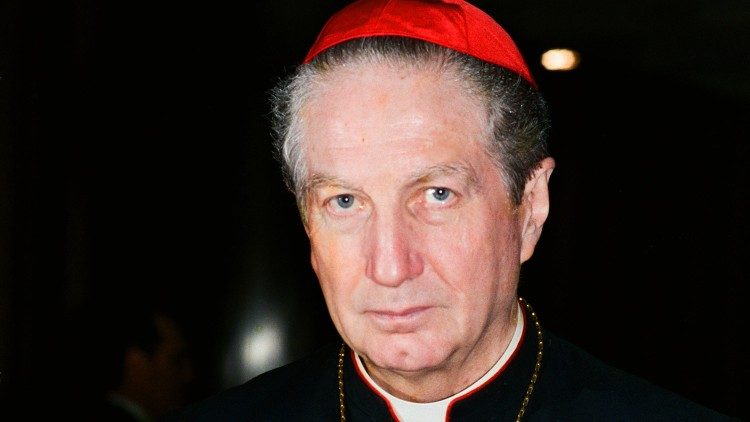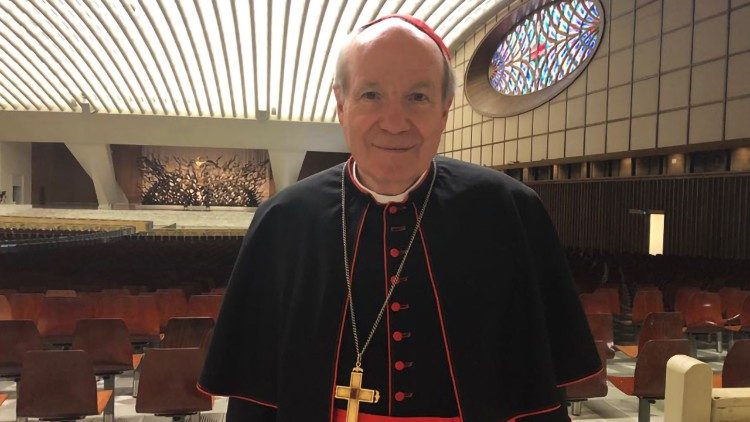Over the holiday break, Catholic Outlook is showcasing some of its most viewed, inspiring and thought-provoking articles from 2022.
The following article is part two of four reports by Br Mark O’Connor FMS, Vicar for Communications, as he reported from the sidelines of the Consistory of Cardinals in August.
This article was originally published on 1 September 2022.
Good News from a Pilgrim Church

A view of the Mass with the new Cardinals and College of Cardinals in St. Peter’s Basilica on Tuesday 30 August. Image: Vatican News
Rome woke up to a typical muggy morning on Wednesday 31 August. It had just seen two intense days of meetings of the College of Cardinals. The last time that Pope Francis summoned the cardinals to an extraordinary consistory was on 12-13 February 2015. So, there was much speculation about what had gone on amongst the world’s Cardinals, in these last few days.
As it happened 31 August was also the tenth anniversary of the passing over into the Lord of the great visionary Jesuit and Italian Church leader: Cardinal Maria Martini S.J.
Many see that the first Jesuit Pope has taken up much of the Martini vision.
In a final interview before his death, Martini made a passionate plea for a more open Church ready to “try new things”, focussed on the word of God and following the path of conversion. To read that illuminating interview See: https://www.ncronline.org/blogs/ncr-today/translated-final-interview-martini
Certainly, it could be argued that Pope Francis has indeed led the pilgrim people of God down some of paths suggested by Martini for its renewed vitality.
But what did the Cardinals themselves, in their ‘closed doors’ discussions, make of the first ten years of the Petrine leadership of Pope Francis?
As many will remember, Francis was elected in 2013 with a clear mandate to reform the Church’s central government and clean up the Vatican’s finances. These recent meetings have been a time to appraise what has been achieved after the last ten years or so.
The good news from reliable sources is that the Cardinals were broadly speaking very happy and supportive of the direction of Pope Francis’s leadership and especially his recent document reforming the Curia. https://www.vatican.va/content/francesco/en/apost_constitutions/documents/20220319-costituzione-ap-praedicate-evangelium.html
The consensus was that, yes, Pope Francis, has certainly delivered on what was asked of him by the Cardinals at the pre-conclave meetings of 2013!
Christopher Lamb, the great Vatican journalist from The Tablet, has pointed out that Francis has indeed delivered what was particularly asked for. By issuing sweeping reforms to the Vatican bank, Holy See investments, regulatory system and giving the green light to an unprecedented and ongoing corruption trial, he has truly performed almost a ‘miracle’.
It is said that in a speech at the Consistory, Cardinal Schönborn of Vienna, greatly praised Francis’s reform of the Vatican finances. One Cardinal also made special mention of the great contribution of Cardinal Pell to this painful but necessary reform.
These are extraordinary achievements by Pope Francis, given the unprecedented level of opposition within the Church itself to his pastoral vision. It is heartening that the Cardinals were so supportive of this vision and endorsed his model of governance and greater lay leadership – albeit with some probing questions, about the limited terms of five years for all those serve within the Roman Curia.
But a break has now been decisively made, moving on from the century’s long clericalist practice within the Curia of ‘careerism’. Ambitious clerics seeking a ‘patron’ to attach themselves to for future ‘promotion’ prospects, will not find that so easy in the future…
Under the new reform, people now serve for a limited time only and then go back to their respective dioceses.
Indeed, it is striking that many Cardinals noted a change of attitude in the Curia under Francis. Diocesan Bishops are now usually welcomed and not spoken down to by smug curial officials.
To explore further what went on in the two-day meetings, I recommend the insightful and accurate analysis of NCR’s Christopher White and Sean Michael Winters. See
https://www.ncronline.org/news/vatican/rome-consistory-showed-pope-francis-vision-taking-root
So yes, the good news is that most of the College of Cardinals are very supportive of the direction of the church under Francis’s leadership.
The new English Curial Cardinal Arthur Roche spoke for many of them when, in his address to Pope Francis on behalf of the new cardinals, he noted that: “Our mission today is to help you carry this cross and not to increase its weight.”
Most but not all Cardinals! It is well known that there does exist a small, well-organised group of Cardinals behind the scenes, who are in severe disagreement with Pope Francis’s leadership. Some of these did speak up at the end of the meetings directly criticising Pope Francis.
According to the anti-Francis blogger Sandro Magister http://magister.blogautore.espresso.repubblica.it/2022/08/31/exclusive-brandmuller-in-consistory-the-pope-wants-to-shut-the-cardinals’-mouths/ the ultra-conservative German Cardinal Brandmüller. in prepared remarks, harshly criticised Pope Francis and what he sees as the ‘silencing’ of cardinals.
Pope Francis has indeed globalised (more than his predecessors) the College of Cardinals. But who is really ‘silencing’ Cardinals? It’s not Pope Francis but the likes of Cardinal Brandmueller himself, who made the extraordinary call that only cardinals residing in Rome should vote in the next conclave!
Outrageously he even suggested that the many Cardinals Francis has appointed from the ‘peripheries’, could be vulnerable to bribery (e.g., simony). Such conspiracy theorising, in reality, only diminishes the credibility of these opponents of the Holy Father.
Apparently, the supporters of such extremism have also convinced themselves that there are some Cardinals who think likewise and are already thinking about ‘their ‘next Pope.
https://catholicherald.co.uk/cardinal-burke-the-dark-horse-in-the-running-to-succeed-pope-francis/
Whilst it is true there was something of a pre-conclave ‘feel’ over the last few days, such speculation is really very silly. Few predicted Jorge Bergoglio would be Pope in 2013 and anyway, the Spirit hasn’t yet decided who Francis’s successor will yet be! Believers leave that up the Holy Spirit – with some relief that such a momentous decision is ultimately guided by God, not by the ideological whims of certain clerics…
Pastoral Diagnosis and styles of future Petrine leadership of the pilgrim people of God
I personally think it is better to think less about particular ‘candidates’, and instead seek to pray and think more deeply about how we as a church, can deepen and build upon the directions of Pope Francis’s synodal way.
The Canadian Jesuit Bernard Lonergan once noted that:
There is bound to be formed a solid right that is determined to live in a world that no longer exists. There is bound to be formed a scattered left, captivated by now this, now that new development, exploring now this and now that new possibility. But what will count is a perhaps not numerous centre, big enough to be at home in both the old and the new, painstaking enough to work out one by one the transitions to be made, strong enough to refuse half measures and insist on complete solutions even though it has to wait.
How that ‘centre’ is navigated in the years ahead is admittedly the subject of much disagreement.
There are some leaders in the Church (including in our church in Australia) who insist that the real issues confronting the people of God that demand leadership are: pro-life issues, religious freedom and what they see as the increasing threat of ‘secularisation’. They have a point – but too often their negativity and ‘culture-war’ strategies alienate many Catholics who admire Pope Francis and his vision of the deeper implementation of Vatican II. And besides all that – I actually don’t believe that combative ‘culture war’ strategies actually work. They are hardly the Gospel kerygma!
Another pastoral strategy, seeks alternatively to follow the Synodal path of Pope Francis and calls on disciples to joyfully reach out to the marginalised and accompany them. This path energises the prophetic imagination of the pilgrim people of God through dialogue. It does not confront ‘secularisation’ so much as an ‘enemy’ but rather wants to encounter and accompany those who struggle to believe.
Synodality and pastoral imagination are, therefore, the subjects of my final two ‘soundings’ from Rome. In my third letter, I will reflect on Synodality arising from my upcoming interview with Sr Nathalie Becquart from the Vatican’s Synodal office. October 2023’s Synod on Synodality is spoken of as the most momentous event in the church since Vatican II.

Xaviere Missionary Sister Nathalie Becquart attends a news conference to discuss the Synod of Bishops on young people, the faith and vocational discernment at the Vatican Oct. 9. Image: CNS/Crux.
In my final and fourth letter, I will conclude by reflecting on another interview – this time with the little-known internationally but remarkable Portuguese priest, poet, biblical scholar and pastoral visionary – Cardinal José Tolentino Calaça de Mendonça of the Vatican Library. Like the priest Tomas Halik of Prague, Cardinal Tolentino has many interesting things to say about encounter and dialogue with the forces of secularisation and reaching out to those searching for God.

A March 2021 file image of Cardinal José Tolentino de Mendonça of the Vatican Library. Image: Vatican News
Conclusion
Rosemary Haughton, in her masterpiece: The Catholic Thing outlines an inclusive understanding of Catholicism – which serves as an antidote to a rigid and narrow understanding of what it is to be Catholic.
The lovely charm of the book is its story of two allegorical twin sisters: Mother Church, the institutional body, while capable of love and compassion, is also domineering and authoritarian, a stumbling block to many; Sophia is wise, loving and mystical.
No doubt, the two ‘sisters’: Mother Church and Sophia – have been very present in the ‘discussions in the now concluded Consistory of Cardinals of August 2022 – under the prophetic leadership of Pope Francis (who I hope will still lead the church for years to come).
Both ‘sisters’ are needed so that the ‘Catholic thing’, with its mandate to love everything and everyone until earth becomes heaven, might be realised. Let the People of God march on! Alleluia!
Br Mark O’Connor FMS is the Vicar for Communications, Diocese of Parramatta and Pope Francis Fellow, Newman College, University of Melbourne.
With special thanks to the PAYCE Foundation for their sponsorship of the Pope Francis Fellowship at Newman College and these ‘Soundings’ from Rome.









